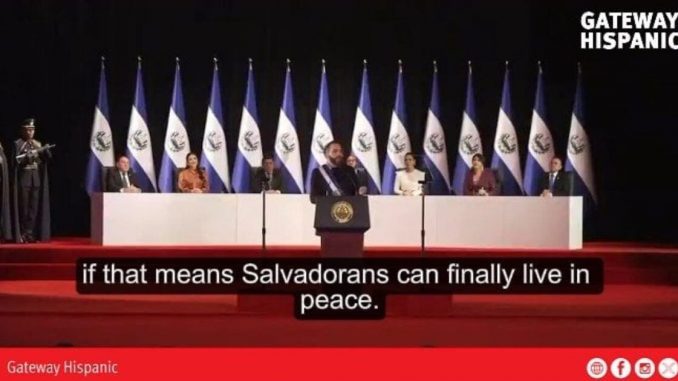
| Published June 3, 2025
El Salvador’s President Nayib Bukele said he would rather be branded a “dictator” than allow criminals to run loose, defying critics in a barnstorming speech marking one year since his re-election.
In a recent nationally televised address marking the first year of his second term, El Salvador’s President Nayib Bukele declared, “I don’t care if they call me a dictator. Better that than seeing Salvadorans killed on the streets.” This statement underscores his unwavering commitment to a stringent security agenda aimed at eradicating gang violence, even amid mounting international criticism over alleged human rights violations and authoritarian governance.
—
🔒 Security Achievements vs. Democratic Concerns
Since the initiation of a state of emergency in March 2022, Bukele’s administration has arrested over 85,000 individuals suspected of gang affiliations. This aggressive approach has led to a significant reduction in homicide rates, positioning El Salvador as one of the safest countries in the Western Hemisphere.
However, this crackdown has been accompanied by reports of arbitrary detentions, suppression of dissent, and erosion of civil liberties. Human rights organizations have raised alarms about the potential for abuse under the prolonged state of exception, which has been extended multiple times.
—
🏛️ Consolidation of Power
Bukele’s re-election for a consecutive term, despite constitutional prohibitions, and his administration’s control over the legislative and judicial branches have intensified concerns about democratic backsliding. Critics argue that such consolidation of power undermines institutional checks and balances essential for a healthy democracy.
—
🌐 International Criticism and Domestic Support
International bodies and human rights groups have criticized Bukele’s methods, citing violations of due process and suppression of freedoms. Despite this, Bukele maintains high domestic approval ratings, with many Salvadorans supporting his tough stance on crime and viewing his policies as necessary for national security.
Here are the key implications of President Nayib Bukele’s recent statement—“I don’t care if they call me a dictator”—and the broader context of his governance in El Salvador:
⚖️ 1. Democratic Norms and Constitutional Integrity
Authoritarian Precedent: Bukele’s dismissal of the “dictator” label signals a normalization of authoritarian rhetoric. It could embolden other leaders in the region to justify similar power grabs under the guise of security.
Weakening of Democratic Institutions: His re-election despite constitutional limits, control over courts, and ongoing state of emergency reflect a consolidation of power that risks dismantling democratic checks and balances.
—
🔒 2. Human Rights and Civil Liberties
Mass Detentions and Abuses: Over 85,000 arrests under the state of exception, many without due process, have triggered serious concerns from human rights groups. Arbitrary detention and lack of legal transparency could foster long-term grievances.
Chilling Effect on Press and Civil Society: The threat of repression has forced journalists and dissidents into exile or silence, undermining freedom of expression and watchdog accountability.
—
📈 3. Security vs. Freedom Trade-Off
Public Support for Authoritarianism: Despite global criticism, Bukele enjoys overwhelming domestic support due to dramatic crime reductions. This reflects a growing trend where citizens may prioritize personal safety over civil liberties.
Model for Others: Other countries with high crime or instability may look to El Salvador as a model for aggressive security policies—even at the expense of democracy.
—
🌍 4. Regional and International Reactions
Tensions with Global Institutions: Bukele’s open defiance of international norms could lead to strained relations with democratic allies, global human rights bodies, and foreign investors.
Limited Leverage from Outside: As long as Bukele delivers safety and maintains popular legitimacy at home, international pressure may have little immediate impact.
🧭 Overall Takeaway:
President Nayib Bukele’s statement—“Call me a dictator, I don’t care”—is more than political bravado. It reflects a growing trend where authoritarian-style governance is embraced as a solution to chaos and insecurity.
While Bukele has delivered dramatic drops in crime, his methods—mass arrests, weakened courts, media suppression, and indefinite emergency powers—raise serious red flags about democratic erosion.
> Bottom line:
Bukele’s El Salvador is becoming a model of “efficient authoritarianism” in Latin America—popular, effective, but dangerously dismissive of civil liberties. His success could redefine how far leaders are willing to go in trading freedom for order.
SOURCES: THE GATEWAY HISPANIC – Bukele: «I’d rather be called a dictator than watch Salvadorans die in the streets»
FRANCE 24 – Salvadoran President Bukele says go ahead and call him ‘dictator’
EL PAIS – Bukele: ‘I don’t care if they call me dictator. Better than seeing Salvadorans killed on the streets’
THE TICO TIMES – El Salvador’s Bukele Says He Doesn’t Care If He’s Called a Dictator





Be the first to comment